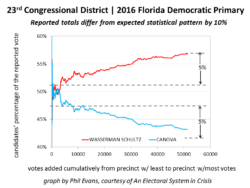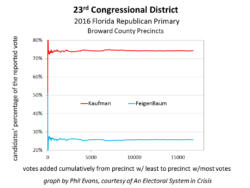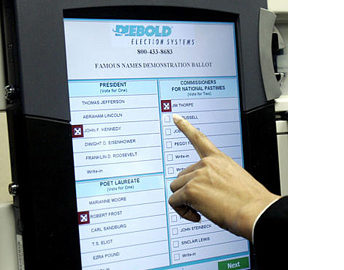Podcast: Play in new window | Download
Subscribe: Apple Podcasts | RSS
We’ve spoken before with journalist lulu Fries’dat about her report An Electoral System in Crisis. That report examined statistical anomalies in the 2016 presidential primaries. She and her team of statisticians found evidence of possible vote rigging in both political parties.
This week, we speak with Fries’dat about troubling findings in her new report on the Florida Democratic primary between Debbie Wasserman Schultz and Tim Canova, An Unpredictable, High Stakes Election. Â
Donald Trump claims the 2016 presidential election will be rigged. He promotes the Republican bogeyman of “voter fraud” — something that is so rare as to be practically nonexistent.
But there are other ways of rigging an election. Some are through the kinds of voter suppression pushed primarily by Trump and the Republican Party — purging legitimate voters from the rolls, requiring onerous ID’s to vote, closing polling places in Democratic leaning precincts and slashing early voting. These tactics have been shown to disproportionately affect voters of color, who tend to vote Democratic.
But some of these voter suppression tactics also showed up in the 2016 Democratic primaries, like the massive voter purging in New York, the wholesale closing of polling places in Puerto Rico and misinformation from election officials in California.
And then there is the threat of hacking electronic voting machines and/or central vote tabulators. As many statistical experts have shown, including researchers from Princeton, it’s easy to hack our voting machines without a trace. Most are a decade old and nearly all have proprietary software held by private companies who deny public oversight—the so-called black box voting. Although our elections are decentralized, if voting machines are hacked in a few key precincts in a few key swing states, the outcome could be changed.
Both major parties could do that — and many believe the Ohio Republican Party did just that in Ohio in 2004, denying John Kerry a crucial win.
We’ve spoken before with journalist lulu Fries’dat about her report An Electoral System in Crisis. That report examined statistical anomalies in the 2016 presidential primaries. She and her team of statisticians found evidence of possible vote rigging in both political parties.

This week, we spoke to her about troubling findings in her new report on the Florida Democratic primary between Debbie Wasserman Schultz and Tim Canova, An Unpredictable, High Stakes Election.  Fries’dat doesn’t know whether or not the ultimate outcome of that primary was changed — but the evidence shows statistical anomalies consistent with vote rigging.

We need to have confidence in our elections. To do that, Fries’dat says, we need to count every ballot by hand — or every image of the original ballot taken by vote machines. And the count needs to be done in a transparent, non partisan process.
lulu Fries’dat is an award-winning documentarian and journalist. She won the Edward R. Murrow award as part of the ABC News team and the Best Documentary Award at the Sunscreen Film Festival for her film Hollerback: (Not) Voting in An American Town.
CORRECTION: Following this interview, Ms. Fries’dat found that some of the research done by Nick Bauer was not accurate. She apologizes for the error. A new version of this interview has been released with updated information.

